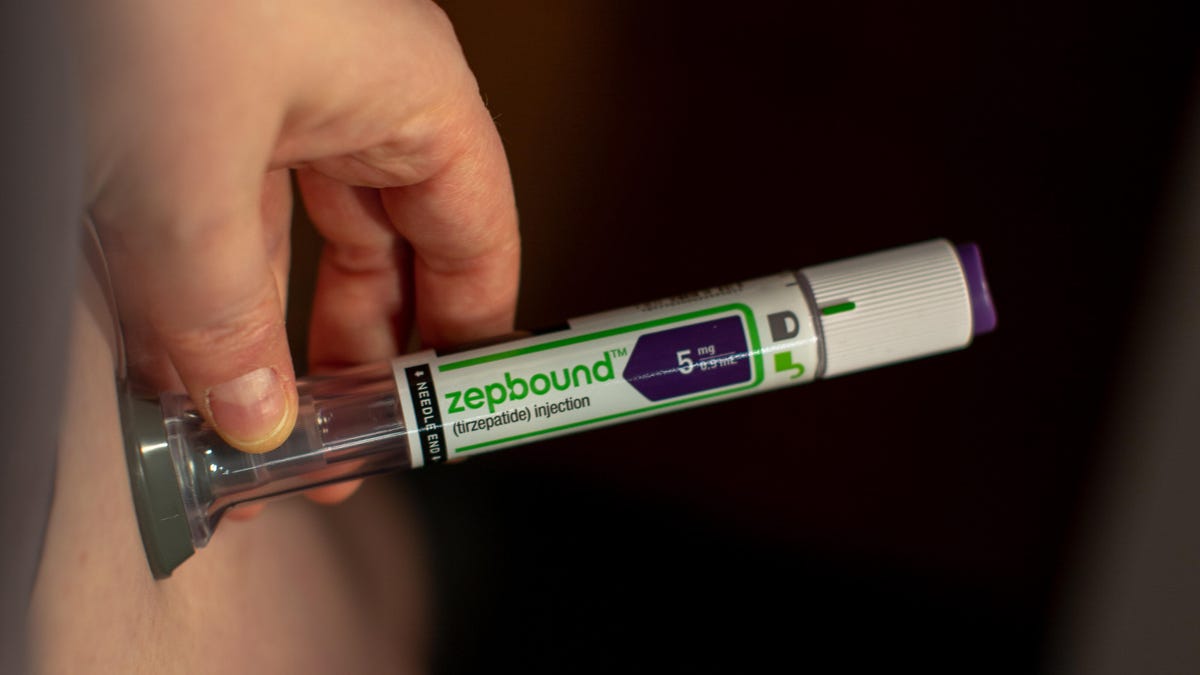
Injections of tirzepatide (called Zepbound in the US) used for weight management and obesity may also reduce the severity of sleep apnea in those who have the condition, according to a summary of results from a study posted Wednesday by Eli Lilly.
Following positive results of the study, which also resulted in weight loss in the group that took tirzepatide rather than a placebo, Eli Lilly plans to submit the findings for regulatory reviews, including the US Food and Drug Administration. If approved, this would widen the already big footprint a new class of diabetes-turned-weight loss medications has had on the drug market and medical world.
Sleep apnea is a potentially serious health condition that disrupts a person’s breathing during sleep. People with obesity may have a higher risk of obstructive sleep apnea because of excess tissue deposits in the upper airway. Following this known relationship between obesity and sleep apnea, particularly in adults, losing weight may reduce the severity of sleep apnea symptoms, whether or not it’s from taking a drug like Zepbound or Ozempic.
Read more: Phillips Has Stopped CPAP Machine Sales. Here’s What It Means For Your Sleep Apnea
Weight-loss drugs as another sleep apnea treatment option?
The news from Eli Lilly focuses on obstructive sleep apnea, the most common type, rather than central sleep apnea, which is caused by miscommunications between your brain and the muscles used to breathe.
While weight loss can reduce the severity of symptoms or improve obstructive sleep apnea for some, it isn’t a cure in many cases. And according to information published in the The Journal of Clinical Endocrinology & Metabolism, the relationship between sleep apnea and obesity is also bidirectional, meaning obstructive sleep apnea can also contribute to obesity or cause someone to weight gain.
According to Axios, the FDA giving additional approval for tirzepatides may result in broader insurance coverage for the drug, making it more affordable and giving people with sleep apnea another option to manage their condition. A common treatment for sleep apnea is using a CPAP machine.
If it’s ever approved, tirzepatide wouldn’t be a suitable treatment for every patient, of course. It’s a prescription drug that wouldn’t be safe for everyone to take.
Read more: New to CPAP Machines? Use These 5 Tips to Make Sleeping Easy
‘Ozempic babies,’ drug shortages and other links to weight-loss drug popularity
In a completely unrelated health concern, yet similarly linked to the rise of weight-loss drugs and potential effects elsewhere in the body, reports of people becoming pregnant unexpectedly while taking weight-loss drugs have been circulating recently as well. This includes semaglutide injections too or brands names Ozempic or Wegovy.
Again, this isn’t entirely surprising because there’s a known link between fertility and weight. Having a higher BMI or obesity can disrupt ovulation and hormones; also, being underweight or having a low BMI can disrupt ovulation or temporarily stop the menstrual cycle. And as Healthline reports, another factor leading to more pregnancies may be the fact that GLP-1 drugs interfere with how the body absorbs birth control.
Eli Lilly’s news about tirzepatide’s effect on sleep apnea symptoms also comes in the middle of reports of Zepbound shortages, just months after its approval. When off-label Ozempic use first boomed into popularity, people with diabetes were reporting problems finding it.
Injections of tirzepatide and semaglutide are both currently listed as in shortage on the FDA’s website.


